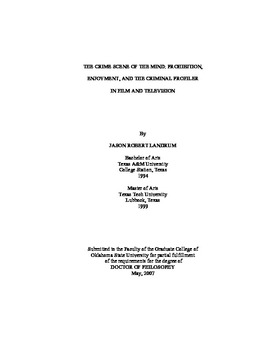| dc.contributor.advisor | Mayer, Robert | |
| dc.contributor.author | Landrum, Jason Robert | |
| dc.date.accessioned | 2013-11-26T08:29:34Z | |
| dc.date.available | 2013-11-26T08:29:34Z | |
| dc.date.issued | 2007-05 | |
| dc.identifier.uri | https://hdl.handle.net/11244/7073 | |
| dc.description.abstract | Scope and Method of Study: This dissertation traces the evolution of the FBI agent in American popular culture from the 1930s to the present day. Until the 1950s, the FBI agent's symbolic status as an elite moral crusader was transmitted through the figure of the G-Man, an action-detective hero featured in such films as G-Men (1935) and The House on 92nd Street (1945). In the 1970s, however, the death of J. Edgar Hoover and the revelation of the FBI's abuse of civil rights changed the image of the FBI agent, often shifting it from the hero to the villain. The fallen status of the FBI agent is redeemed by the emergence of the criminal profiler in the 1980s, and this dissertation shows that the criminal profiler first seen in Manhunter (1986) and The Silence of the Lambs (1991) combined the heroism of the G-Man with the disgraced agent of the 1970s to form an ambiguous character that reflected, on the one hand, the Bureau's attempt to recuperate its image, and, on the other hand, changing attitudes towards the symbolic authority of the FBI. This dissertation theorizes the appeal of the shift from the G-Man's moral clarity to the profiler's ambiguity. | |
| dc.description.abstract | Findings and Conclusions: The shifting image of the FBI depends on the difference between two portrayals of solving crime; whereas the G-Man solves crimes through a physically challenging quest, which leads to the satisfactory apprehension and punishment of the criminal, the profiler replaces the G-Man's quest with the injunction to become the criminal, authorizing a fantasy of complete criminal satisfaction, in which the audience is invited to enjoy. Working within the tradition of Jacques Lacan and neoLacanian theorists such as Todd McGowan, Slavoj Zizek, and Renata Salecl, this study contends that contemporary culture is in the process of transforming itself from a society based on prohibition to one based on private enjoyment. Ultimately, this dissertation concludes that the appeal of the criminal profiler is a reflection of society's inward turn towards private enjoyment and away from social and communal obligations. | |
| dc.format | application/pdf | |
| dc.language | en_US | |
| dc.rights | Copyright is held by the author who has granted the Oklahoma State University Library the non-exclusive right to share this material in its institutional repository. Contact Digital Library Services at lib-dls@okstate.edu or 405-744-9161 for the permission policy on the use, reproduction or distribution of this material. | |
| dc.title | Crime scene of the mind: Prohibition, enjoyment, and the criminal profiler in film and television | |
| dc.contributor.committeeMember | Manon, Hugh | |
| dc.contributor.committeeMember | Wallen, Martin | |
| dc.contributor.committeeMember | Moses, L. G. | |
| osu.filename | Landrum_okstate_0664D_2240.pdf | |
| osu.accesstype | Open Access | |
| dc.type.genre | Dissertation | |
| dc.type.material | Text | |
| thesis.degree.discipline | English | |
| thesis.degree.grantor | Oklahoma State University | |
